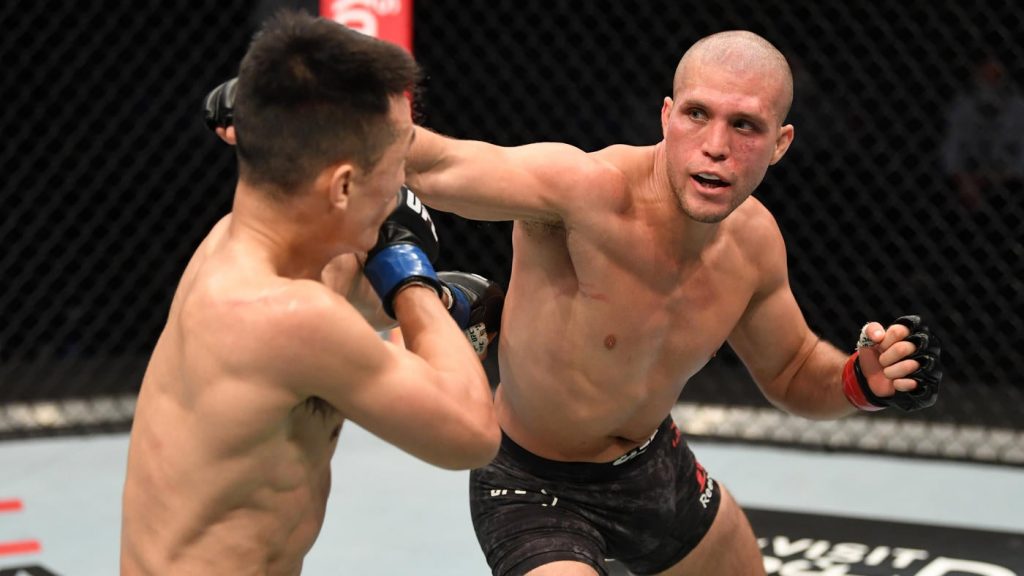#TrueTalkTuesdays 105
Brian Ortega has done something many fighters struggle to do – make a comeback after suffering a terrible defeat and experiencing an ego death.
His loss to Max Holloway was brutal. Not only was it his first loss of his career, it was a one-sided beating. On top of this beating, was the real physical toll it took on his body. He had to undergo surgery to repair some of the damage, and many months to recover.
That was nearly 2 years ago, and he hasn’t fought until this past weekend. An experience like that could end careers. Hell, we have seen them end for much less. But it seems for Brian Ortega, this loss was a blessing in disguise.
It turns out that the young Ortega was kind of reckless in regards to his attitude towards training. Perhaps because he came from a rough background, or was just a natural athlete, but it seems he took his gifts for granted. Poor dieting, unfocused training regiments, and other issues have been brought up as of late to the previous iteration of Brian Ortega.
When people think of death, they often jump right to sadness and depression – thinking death can only be a bad thing.
However, death can be a good thing too. Particularly when you allow the weak parts of yourself to die and let go of them. After suffering that difficult loss, Brian had to allow the old him to die, so that a new and improved version of him can be born.
Such a transition is never easy, which is why we seldom see it. Especially when you have someone who was so successful, it can be hard to convince them that change is needed. But anyone who watched his last fight with the Korean Zombie can attest that he has definitely stepped up a notch. It’s often why people need to hit “rock bottom” before making a big change in their life.
But, if you are wise – you can create change without having to suffer the pain of dying. The part that makes change difficult is the ego. To change, means that you are acknowledging whatever you were doing before was suboptimal, or flat out wrong. People who do things wrong are generally seen as being inferior, ignorant, or stupid.
So guess what? When you are deciding to make a change in your life, the signal your ego is getting is that you were living as an idiot your whole life previous to that change. The ego is very defensive, and doesn’t like the idea of being considered stupid. So instead, it will make excuses, or flat out deny the truth – even if it’s staring it in the face.
I’m sure we all can find instances where we were defending indefensible positions simply because our ego wouldn’t admit to being wrong. I remember one time that I got into a heated argument with my brother over a lost wallet. I was so dug into my side of the story that I was completely blind to the truth. I believe my father had located it, which corroborated my brother’s story without a doubt. Yet, I remained steadfast in my stupidity for another 15 minutes, just because my ego did not want to suffer the embarrassment of being totally wrong.
And that was just a trivial issue of no importance whatsoever, which I’m sure many people can relate to. Imagine with something more important and core to your way of being how hard it would be to admit you were wrong so that you can grow?
What do you think? Do you agree or disagree?
Comment with your take on this. And if you like this article, please do me a solid and share it with your friends. Thanks!




I enjoy reading your articles , You have a good outlook on things . thanks
Glad you enjoyed it ?
Your story about yourself at the end of the article is very good. It’s not always easy to admit when we’re wrong to begin with. But to tell everyone in an email in an effort to teach a good lesson is very admirable. Thank you.
Well this was easy to tell, and I’m sure my brother will remember and laugh about it when he reads this ?
I have made many mistakes in my life that had more severe consequences that I can admit freely, because I have accepted them as my fault, learned a lesson, and then moved on.
For example, one of the major faults that shortened my competitive career was not tending to my health as much as I should have. I trained hard in seasons, and would get out of shape, then get back in shape, like a seesaw. I used half truths to justify this practice, like how Marathon runners have a specific peaking schedule, and can’t be at top shape year round, ignoring the fact that they don’t allow themselves to get totally out of shape at any point, not to mention the demands of their sport are very different.
I also neglected strength training, flexibility, and doing physical therapy and rehabilitation. To the point that I entered nearly every competition with injuries. Not like minor bruises, but popped ribs, separated ac joints, knee tears, etc.
I’m 39 now, and I’m in better shape “off season” than I ever was. Stronger than I ever been, leaner, and more energetic. Because I realized this and made the proper adjustments. Although it doesn’t matter from a competitive standpoint anymore, I get to lead a better life now and hopefully pass that lesson on to the next generation.